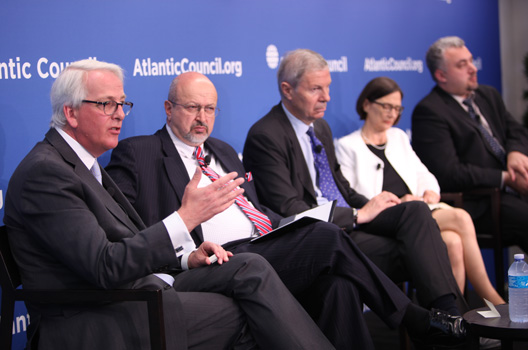 More confidence-building measures will be required to defuse tensions between the West and Russia, Lamberto Zannier, the secretary general of the Organization for Security and Cooperation in Europe, said at the Atlantic Council on May 20.
More confidence-building measures will be required to defuse tensions between the West and Russia, Lamberto Zannier, the secretary general of the Organization for Security and Cooperation in Europe, said at the Atlantic Council on May 20.
Such measures should include working groups as a key tool for “dispelling concerns” and setting “parameters,” said Zannier. Urging dialogue and greater territorial integrity, he welcomed the idea of “new forms of diplomacy” that would focus on a non-traditional constituencies and actors.
Zannier was part of a panel hosted by the Council’s Future Europe Initiative. He was joined on the panel by Jean-Marie Guéhenno, president and CEO of the International Crisis Group; Barbara Haering, director of econcept Inc.; Sergi Kapanadze, director of Georgia’s Reforms Associates; and Adam Rotfeld, a professor at Warsaw University and the College of Europe. Ivo Daalder, president of the Chicago Council on Global Affairs, moderated the discussion. They panel members discussed their findings in “Back to Diplomacy: Final Report and Recommendations of the Panel of Eminent Persons on European Security as a Common Project.”
Tensions between NATO and Russia have escalated since March of 2014 when Russia annexed Crimea from Ukraine. Russia has actively supported separatists fighting in eastern Ukraine. OSCE observers are currently monitoring a fragile ceasefire between Kyiv and the Russian-backed rebels.
US Defense Secretary Ash Carter has described Russia as the top national security threat to the United States; and NATO has responded to a revanchist Russia with plans to deploy four combat battalions in Poland and the three Baltic States: Estonia, Latvia, and Lithuania. The Alliance also intends to conduct major military exercises in Poland this spring and US military officials earlier in May inaugurated a missile interceptor site in Romania that will be part of a larger missile defense shield.
Russia has responded to these developments with a pledge to deploy three divisions of roughly 10,000 troops each to its western and southern flanks by the end of this year.
Chuck Hagel, a former US defense secretary and a current distinguished statesman at the Council, on May 10 warned NATO against getting caught in a “Cold War buildup” with Russia. He also advised the next US president to directly engage Russian President Vladimir Putin.
A US role
The conversation during the panel discussion was dominated by views on the United States’ transatlantic security responsibilities, particularly in Ukraine.
“The United States should not be uninterested in European security,” said Daalder. “If the United States takes the lead [in responding to the conflict in Ukraine] then the capacity of Europe to do so is affected,” he added.
While Daalder maintained that the crisis in Ukraine is a distinctly European issue, Haering contested: “this crisis over Ukraine goes beyond Europe and is a geopolitical threat to many countries.” She used this line of argument to preface her case for US involvement in European security.
Questions about US involvement in European security—military as well as diplomatic—come at a time of “fragility of public opinion in Europe,” said Guéhenno. “There would be nothing worse than a United States that disengages faster than a Europe integrates.”
Regardless of the facts, the Russian propaganda machine will claim that the United States is providing extensive support to Ukraine, said Kapanadze. If the Kremlin is already manipulating the message, “it’s better to have a stronger US engagement, not only diplomatic, but more assertive militarily” to regain control of the narrative in Ukraine, he added.
A diplomatic path
When it comes to engaging Russia, the panelists reiterated the need for perspective. Guéhenno cautioned against proceeding down a path with only one viewpoint. “Gradually you discover that the roads don’t go in the same direction, and then you have a problem” and must walk back, he said.
So, how do we proceed?
Haering advocated a strategy “that goes country by country,” in concurrence with a “diplomatic, comprehensive initiative.”
“Recognizing there is a real problem” and focusing on “implementing the rules” that already exist, instead of trying to rewrite policies, was the theme of Guéhenno’s argument away from security based on pure luck.
Traditional diplomacy is no longer the path forward, “we need to learn to work in different ways,” said Zannier. Learning to innovate new diplomacy responses is the path forward to “a new phase of cooperation and peaceful interaction.”
“Not everything has to be re-invented, but many things could be rediscovered” said Rotfeld of diplomacy. His co-panelists agreed.
Three narratives
In “Back to Diplomacy,” the authors lay out three narratives: the view from the West, the view from Moscow, and the view from states in between. “Part of resolving the present crisis is recognizing the way that various actors read the European crisis is very different,” explained Guéhenno. And with regard to Russia’s role, he continued, “there is a certain coherence in the Russian reading of the crisis…and you have to understand these viewpoints to really engage.”
Haering focused on using these narratives to form consensus by providing a wider range of perspective not just to policy makers, but to civil society in general. There is a need to “[rebuild] dialogue wherever we can,” said Haering.
Victoria Langton is a Digital Communications Assistant at the Atlantic Council. Follow her on Twitter @LangtonVL.
Image: From left: Ivo Daalder, president of the Chicago Council on Global Affairs, moderated a panel discussion with Lamberto Zannier, secretary general of the Organization for Security and Cooperation in Europe; Jean-Marie Guéhenno, president and CEO of the International Crisis Group; Barbara Haering, director of econcept Inc.; and Sergi Kapanadze, director of Georgia’s Reforms Associates, at the Atlantic Council on May 20. (Atlantic Council/Victoria Langton)
